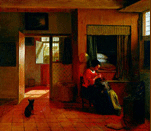










Susan S. Lanser
English, Women's Studies, and Comparative Literature
Brandeis University
I have argued elsewhere that in the seventeenth century private intimacies between women became public relations, producing an intensely erotic discourse of same-sex affiliations in several European countries and colonies. Scholars have explored the implications of these homoerotic writings for understanding women’s literary history and individual private lives; here I will be exploring the political work that I believe this pervasive public profession of female intimacy was accomplishing.
I will argue that the public performance of female same-sex desire is deeply connected to shifting notions of the body politic, and that privileged-class women’s subjectivity asserted itself with striking visibility through an economy of same-sex desire. By positing women as social subjects with separate from and potentially inimical to the interests of men, “sapphic” subjectivity also threatens to rupture intra-class relations.
This dynamic not only gives public consequence to seemingly private matters, but suggests that “sapphic” desire may itself be produced by a particular political economy. Signifying a social excess that cannot be reduced into a patriarchal and status-ranked order, female intimacy is also a fragile institution: dependent on delicate negotiations, it also gets reproduced as anxiety and obscenity.
If my arguments are plausible, then the constitution of “sapphic” subjects in the seventeenth century has important consequences for the social and political position of women in general and indeed for the engendering of European modernity. Such a possibility has methodological implications for studying early modern women, and I will conclude my presentation by making a case for the critical place of a history of female homoerotic relations both in women’s history and in history.
|
|
|
||||||
|
|
 |
 |
|
||||
 |
|
 |
|
||||
|
|
|
||||||
|
|
|
||||||
 |
|
||||||
|
|
|
||||||
| |
|
||||||
 |
|
||||||
 |
|
||||||
 |
|
||||||
 |
|
||||||
|
|
|
||||||
|
|
 |
|
|
||||
 |
|
||||||
|
|
|
|
|
|
|
|
|